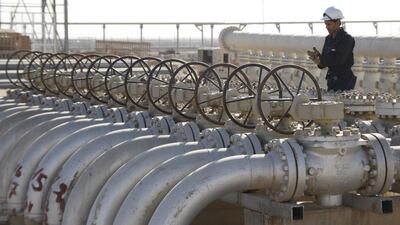International oil and gas companies operating in Iraq are monitoring a tense security situation for their people working in the country amid heightened US-Iran tensions in the region.
Shell, BP, Exxon Mobil, Russia's Lukoil and Italy's Eni are among foreign companies working in the south of the country.
On Wednesday the US State Department ordered that all non-emergency government employees must leave.
It is understood that BP's operations are not impacted in the wake of the announcement.
A source in Iraq told The National that Exxon has begun to evacuate its staff from West Qurna near Basra.
While the US company said it "has programmes and measures in place to provide security to protect its people, operations and facilities", it declined to directly respond when contacted because "as a matter of practice, we don’t share specifics related to operational staffing at our facilities".
However, Exxon underlined its commitment "to ensuring the safety of our employees and contractors at all of our facilities around the world”.
Shell has said it is monitoring the situation.
Oilfields in the south account for almost 90 per cent of Iraq's production.
Exxon is also operating in the Kurdistan region in the north of the country. In 2014, some oil companies pulled out staff following the rise of ISIS.
The US military had said on Tuesday that the threat level in the Middle East had been raised as Washington had detected new and urgent threats from Iran.
On the same day, Yemen's Houthi rebels used armed drones to attack two of Saudi Aramco's oil pumping stations and forced the state producer to briefly shut its East-West pipeline. Saudi's Minister of State for Foreign Affairs Adel Al Jubeir has directly blamed Iran, which supports the Houthis. The drone incident came two days after an attack on four oil tankers - two owned by Saudi Arabia, one by the UAE and another by Norway - off Fujairah.
The UAE has not characterised the sabotage or blamed anyone for Sunday's ship attack, but US national security agencies are said to believe proxies sympathetic to or working for Iran may have been behind it. Tehran has distanced itself from the incident, which no one has claimed.
Washington and Tehran have been increasingly at loggerheads since US President Donald Trump withdrew from Iran nuclear deal last year and re-imposed sanctions on the country.
Germany's armed forces also announced this week that they would suspend training operations in Iraq because of increasing regional tension.


